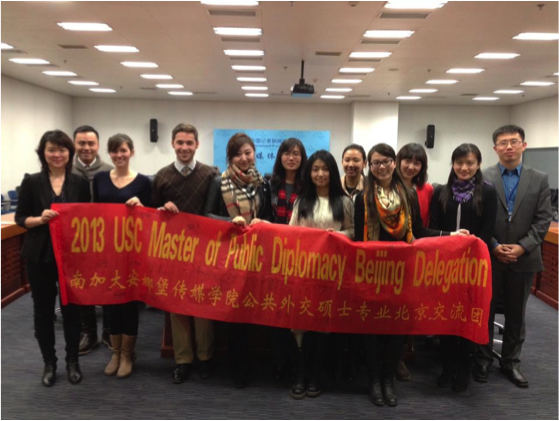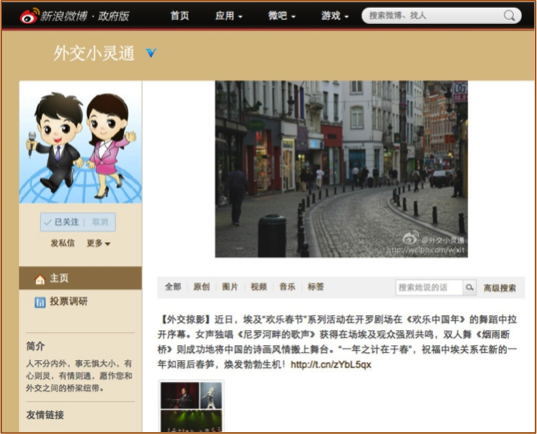Among the principal assets of U.S. public diplomacy are American values. They are admired around the world, even by many people who dislike American policy. No other political system offers such extensive individual and...
KEEP READINGThe CPD Blog is intended to stimulate dialog among scholars and practitioners from around the world in the public diplomacy sphere. The opinions represented here are the authors' own and do not necessarily reflect CPD's views. For blogger guidelines, click here.
MPD in China 2013: An Hour Inside the Chinese Ministry of Foreign Affairs
APDS Blogger: Danni Li
BEIJING--
It was one of those hazy afternoons in Beijing; exiting from the subway station, I felt lost among the hustle and bustle of the capital city. If Shanghai, the city where I lived for over a decade, is reputedly large, Beijing, in contrast, appears frustratingly huge. Despite more orderly constructed roads than Shanghai, Beijing always renders in me a sense of disorientation due to its overwhelming size. Places like the Ministry of Foreign Affairs (MFA), are even more confusing, with its office buildings barren of any signs indicating who inhabits them. Wandering around the crossroads and losing, to smog, the sun as a compass, I was burning with worries inside. “What if I am late for the meeting?” To my relief, I was the first one; to my horror, I was the only one there ten minutes before our group meeting with MFA staff.
The MFA was the final ‘stop’ on our week-long research trip to China, where the nine of us visited a diverse group of China’s public diplomacy (PD) actors, ranging from academia and think-tanks to companies and government agencies. It was an amazing experience to exchange ideas with the scholars and practitioners, rather than read their thoughts through academic papers or news reports. It was also a confusing experience to be exposed to varied and even conflicting opinions on what PD should be and how China conducts it. The MFA, I hoped, would dispel the confusion as an authoritative entity, telling me “Ok, here is our definition of public diplomacy…”

Our hosts were all in their late 20s or early 30s, surprisingly younger than I had expected. Yet I quickly read two messages from that: 1) public diplomacy remains an experimental endeavor, to which new ideas might contribute more than years’ experiences; 2) our meeting was likely to be more informative than official. The second message turned out to be only partially true. At least we did not have to worry much about our group tardiness, as our hosts displayed a higher degree of understanding than their senior colleagues would have. The female staffer from the MFA Public Diplomacy Office presided over the meeting and started with a formal introduction—a routine component in any Chinese meeting of the kind. I felt uncomfortable when she read the prepared transcripts, because of the cultural differences between the officials and my American classmates. But when I thought of how much time I myself spent preparing presentations throughout semesters and how verbally clumsy I had been in face of spontaneous questions shot at me in class, I became more sympathetic with her. Perhaps, the language, the skills of public speaking, as well as other components of communicating in a western style would remain a starting point, yet a difficult one, for China and its people to grasp before reaching out to the foreign public.
MFA’s e-Diplomacy
We not only discussed formal public diplomacy but heard from the e-diplomacy team at the MFA as well. Our host was unarguably considerate by inviting her colleagues from other departments to join the conversation. Therefore, we were able to meet the person responsible for MFA’s Weibo (microblog) account. Similar to the tactics of her PD colleague, the Weibo editor started her remarks with impressive figures: opened in the early April 2011, MFA’s account had acquired 627 million followers by 2012 . Measurable outcomes matter in PD evaluation, as we have been taught, but such statistics alone cannot support the rosy picture. An obvious way to refute the seeming success would be to say, “but these followers are predominantly Chinese…” This leads back to an oft-debated issue, the domestic dimension of China’s public diplomacy.

We got two answers from the Weibo editor: 1) Chinese people are interested in foreign affairs; 2) it is necessary for them to know how the government is protecting national interests. To paraphrase a little bit, so many efforts are invested in explaining foreign policy to the domestic public because there is a demand from the public and there is a need to educate them. Unfortunately, I could easily find statistics to argue against such a demand. For instance, a recent public opinion survey of Chinese netizens indicated only 2.5% of the questioned showed interest in foreign affairs. Likewise, the expert on online public opinion monitoring who we met two days prior simply told us, “The average public does not care about foreign affairs.” Still, none of us argued with her, not from a face-saving concern (alright, not totally), but for the understanding that her exposure only to internationally-minded netizens might have blinded her to the possibility that the latter are only a small portion of the whole group.
That said, however, it remains a problem if quality is not addressed properly during MFA’s outreach efforts. By quality, I don’t mean the quality of each piece of microblogs; rather, more attention is merited to the quality of interaction between the MFA and its intended audience. Running a collective Sina Weibo account ourselves regarding news and thoughts on public diplomacy, we have learned how important and valuable it is to respond to comments/questions. If the MFA claims its Weibo account is fulfilling its purpose (to meet the public demand and to educate them), better evidence of its success would have been active interactions with netizens on the platform.
How important is MFA in China’s PD?
Of course, there are many more questions to ask about e-diplomacy—say, how could they be so shortsighted as to allow Xinhua to set up a Twitter account only to immediately become a laughing stock among foreign journalists. But no clarifying answer was expected, not only because our hosts are civil servants who won’t say anything against policy in such a capacity and in such a ‘foreign-related’ setting, but also because of a larger picture: the limited influence MFA actually wields in China’s PD. In part II of this post, I will explore the limitation of their power, their strategy as well my own interpretation of domestic dimension of China’s PD.
Danni Li is a graduate student pursuing a Master's degree in Public Diplomacy from USC's Annenberg School for Communication & Journalism.
Visit CPD's Online Library
Explore CPD's vast online database featuring the latest books, articles, speeches and information on international organizations dedicated to public diplomacy.
POPULAR ARTICLES
-
January 29
-
January 20
-
December 17
-
January 28
-
December 15
Join the Conversation
Interested in contributing to the CPD Blog? We welcome your posts. Read our guidelines and find out how you can submit blogs and photo essays >.













